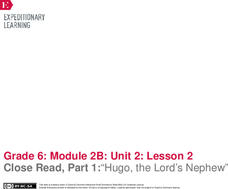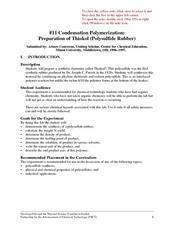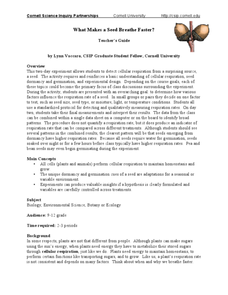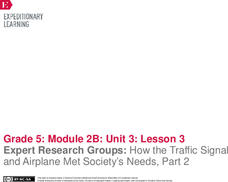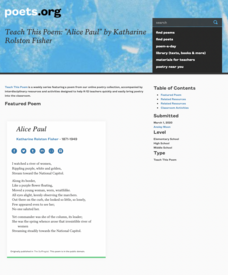National Geographic
Altitude: What's in the Air?
Introuduce your scientists to the differences in air at varying altitudes with a colorful explanatory graph. After some discussion, they view unbelievable footage of mountain-climbing Leo Houlding and a narrative about how he might do...
Novelinks
Touching Spirit Bear: Question Answer Response Strategy
What types of questions help readers learn the most? Sixth, seventh, and eighth graders learn how to ask four types of questions from the Question Answer Response (QAR) reading strategy to help grow their comprehension of Touching Spirit...
EngageNY
Speaking and Listening Skills: Practice
After reviewing their resources from the unit, scholars participate in multiple group discussions with a World Café activity. During the discussions, they share ideas about their focus questions pertaining to Canada's natural resources...
EngageNY
Close Read, Part 1: “Hugo, the Lord’s Nephew”
Fourth time is a charm. Learners complete multiple reads of Hugo, the Lord’s Nephew. On the fourth read, they make notes about each page on sticky notes. They then complete a think-pair-share activity with a partner to determine the...
EngageNY
Close Reading: Blue Creek, a Rainforest in Belize (Page 12)
Peace and quiet. After reading page 12 of The Most Beautiful Roof in the World, scholars participate in a silent conversation with a chalk talk activity. They take turns describing how the rainforest is diverse by writing on chart paper....
Curated OER
Looking at the World Through the Eyes of Chuck Close
First graders examine and analyze various works of art by Chuck Close. They listen to a book about Chuck Close, discuss images of his artwork, and create original paintings in the style of Chuck Close.
Curated OER
Sonnet Explication
Students analyze close readings of poems, looking up words in the dictionary, and discussing the major parts of dictionary definitions, including word origin and parts of speech. They examine sonnets, then compare/contrast their findings.
Curated OER
Writing An Article Lesson Plan
Review active and passive voice with young writers. They will use the passive voice to write persuasive articles encouraging healthy diets. The activity includes brainstorming activities for the writing, as well as a homework extension...
Curated OER
Fossil Fuels (Part I), The Geology of Oil
Junior geologists work through three mini-lessons that familiarize them with the formation and location of fossil fuels. Part one involves reading about petroleum and where it comes from via a thorough set of handouts. A lab activity...
Curated OER
Condensation Polymerization: Preparation of Thiokoll® (Polysulfide Rubber)
This lab activity is geared toward experienced chemistry learners, in particular, those who are familiar with organic chemistry. They will create a synthetic elastomer and then make observations and measurements of its different...
Curated OER
What Makes a Seed Breathe Faster?
Here's a five-star lesson plan in which inquisitors conduct sophisticated experimentation with cellular respiration in plant seeds. Placing seeds in a closed system they measure the amount carbon dioxide produced and relate it to...
Curated OER
Epic Improvisation
Really? Rapping The Odyssey? Really. A discussion of the oral tradition of story telling and its links to Epic poetry sets the stage for a series of activities that encourage improvisation to integrate music into other classrooms....
K20 LEARN
Lord of the Flies Unit, Lesson 4: Bad to the Bone
Is the nature of humans inherently good or evil? That is the question scholars consider in the fourth lesson of the Lord of the Flies unit. In a Four Corners activity, they examine statements about human nature and stand by the poster...
National Endowment for the Humanities
“The Great Migration” by Minnie Bruce Pratt
Minnie Bruce Pratt's poem, "The Great Migration," offers young scholars an opportunity to reflect on how where we come from influences who we are. Groups conduct a close reading of the poem, recording observations about the poem's...
Florida Department of Environmental Protection
Water's Journey Expedition
Step into a scientist's shoes to go online and discover the Florida Springs Expedition, and participate in two activities focusing on how humans impact the environment. The first activity asks scholars to summarize the six dispatches at...
EngageNY
The Hero’s Journey, Part 1: What is a Hero?
That was heroic! Scholars quickly look over What is a Hero to determine and discuss the structure of the text. They then read the introduction and Act 1 closely to find the gist and annotate the text. They circle unfamiliar words and...
EngageNY
Expert Research Groups: How the Traffic Signal and Airplane Met Society’s Needs, Part 2
Ready, set, act! Using the fun resource, pupils patriciate in a vocabulary charades activity to practice key terms from the unit. Next, scholars work in expert research groups to read an article about the invention of the traffic signal...
Academy of American Poets
Teach This Poem: “As I Walk These Broad Majestic Days” by Walt Whitman
Walt Whitman's poem "As I Walk These Broad Majestic Days" offers scholars an opportunity to practice their noticing skills. They first examine a postcard of the Newport News Shipyard listing things they notice about the image and how...
Academy of American Poets
Teach This Poem: "The Tradition" by Jericho Brown
To begin this lesson, class members examine Antonius Hockelmann's painting "Tree Flowers II," record elements of the painting that they notice, and share their observations with a partner. Next, pupils do a close reading of Jericho...
Learning for Justice
Mary Church Terrell
Excerpts from an 1898 speech by civil rights activist Mary Church Terrell offers young scholars an opportunity to investigate how Black American women fought for civil rights long before Rosa Parks and the civil rights movement of the...
Learning for Justice
Mary McLeod Bethune
Young historians conduct a close reading of the text of an interview with Mary McLeod Bethune, the daughter of former slaves who taught herself to read, grew up to establish schools for other Black women, and went on to become an advisor...
Academy of American Poets
Teach This Poem: "Alice Paul" by Katharine Rolston Fisher
Powerful women need not look like Wonder Woman. After writing a paragraph about a strong woman they know, young scholars examine images of Alice Paul and then do a close reading of Katharine Rolston Fisher's poem "Alice Paul." Finally,...
Academy of American Poets
Teach This Poem: "When Fannie Lou Hamer Said" by Mahogany L. Browne
After watching an excerpt from a video of Fannie Lou Hamer's testimony before Congress, pupils do a close reading of Mahogany L. Browne's poem "When Fannie Lou Hamer Said," annotate words and phrases that draw their attention and list...
National Endowment for the Humanities
“Every Day We Get More Illegal” by Juan Felipe Herrera
A study of Jan Felipe Herrera's poem "Every Day We Get More Illegal" opens the door for a discussion on immigration. To begin, class members examine the photograph "Desert Survival," record their observations of the image, and then...





